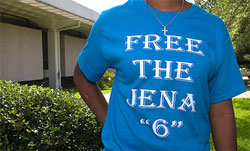This fall, for the fifth year, I’m teaching a course at Harvard. I spent Monday, the first day of the semester, in Cambridge. This year’s course, based at the divinity school, is titled “Faith and Politics: Should They Mix and How?” These undergraduate and graduate students come from the divinity school, but also from other schools — the Kennedy School of Government, business school, law school, and other universities and seminaries in the Boston area.
It’s a lot of work and time preparing for each week’s lecture (you can’t just do your stump speech for 12 weeks to students as bright as these), commuting there and back on Mondays, meeting with many of the students one-on-one or in small groups, and, of course, reading and grading papers. But I have found it to be well worth it. I love the great events we have around the country, like we had in Iowa last week where we drew 1200 people on a weekday night in Iowa City — more than the candidates are getting these days. But I also love drilling down deeper with a group of 100 smart, eager, critical, (and becoming) committed young people.
Here is the description of this year’s course:
The role of religion and values in public life has always been important in American history, but is now a major political issue. There are those who would restrict religion to the private sphere, those who narrow it to only a few “moral” issues, and those who believe it applies to a broad agenda of issues that affect all of human life and society. For years, the debate has been dominated by the Religious Right, but it is now becoming broader and deeper as other voices are heard. On some of the biggest issues of our time, it now seems possible that faith can be used as a bridge to bring us together on common ground rather than a wedge to divide us.
We will also discuss how the new focus of faith communities on issues like global poverty, climate change, terrorism and war, pandemic diseases, human trafficking, human rights, and genocide could provide the “tipping point” in finding elusive solutions. We will discuss what new movements around those questions would look like and how they are already are emerging. All this will be placed in the historic context and categories of religious engagement with society. We will look again at how H. Richard Niebuhr’s classic typologies might apply today.
This course will explore the connection between spiritual renewal and social justice, and how the revival of faith can change society. We will look at that both historically and in our present context. We’ll also look at it in relation to different faith traditions. When politics fails to resolve or even address the great moral issues of the day, social movements often rise up to change politics and meet the challenge. And the best social movements seem to have spiritual foundations.
We will examine these questions from political, theological, spiritual, historical, and practical perspectives. We’ll explore movements past and movements now possible. Given the fall 2007 context, we will discuss how faith and politics was discussed in the last two elections of 2004 and 2006, how it is changing substantially, and why the 2008 election could be very different, on matters of faith and politics, than any campaign in recent years. The agenda of the religious community is changing significantly, and Time magazine reports the “leveling of the praying field” between the two parties.
This course is for anyone who wants to further explore the relationship between religion and public life, and the only prerequisite is interest. Whatever one’s beliefs (or non-beliefs), the course is planned to help us better understand how the relationship between faith, politics, and society can be healthy, dynamic, and respectful of the First Amendment. The course can also inform people in public life who want to act consistently and appropriately as people of faith.

